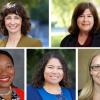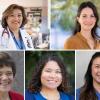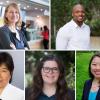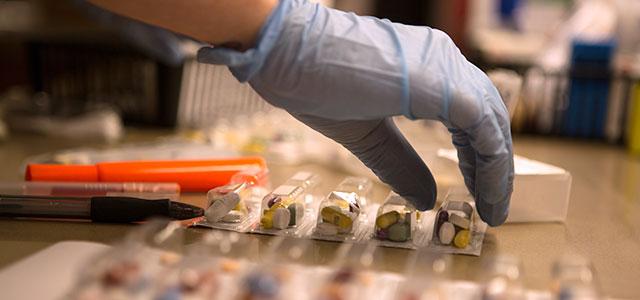
Mary Shiels distributes medication to her HIV-positive patients (photos by Elisabeth Fall).
Finding the Right Clinical Training and Experience
For newly minted advanced practice nurses with a focus on HIV/AIDS, getting clinical experience in their chosen specialty area can be a challenge. Erin R. Lutes and Mary Shiels are 2013 graduates of UC San Francisco School of Nursing, who with the help of the School found a way to overcome that challenge at the only call center in the country that provides immediate HIV/AIDS advice to medical providers nationwide.
Housed at San Francisco General Hospital, the federally funded Clinician Consultation Center’s team of consultants includes clinical nurse specialists and adult-gerontology nurse practitioners (AGNPs) from the School as part of a collaboration launched last year. The nurses, who join physicians and pharmacists as center consultants, presently work on the PEPline and PrEPline – answering questions about post- and pre-exposure prophylaxis, respectively – and the Perinatal line, triaging callers with concerns about HIV/AIDS in pregnancy and childbirth.
Carol Dawson-Rose, who coordinates the School’s advanced practice public health nursing HIV/AIDS program, says working at the center provides nurses with a rigorous hands-on learning experience that’s an excellent pathway to future jobs.
“It’s an incredible experience because you’re with all of these experts who are there to teach and train each other; it’s a wonderful environment,” says Dawson-Rose, who has been affiliated with the center since it started and helped forge the partnership with the School.
Social Justice
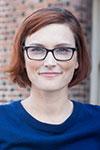 Erin R. Lutes Lutes, whose undergraduate degree is in anthropology, went to nursing school after years working for national and international nonprofits with a strong health care focus. A clinical nurse specialist (CNS) in Advanced Public Health Nursing with an HIV/AIDS and Global Health minor, she works at the center about 16 hours a week and has a second job at the Southeast Health Center, a community clinic run by the San Francisco Department of Public Health.
Erin R. Lutes Lutes, whose undergraduate degree is in anthropology, went to nursing school after years working for national and international nonprofits with a strong health care focus. A clinical nurse specialist (CNS) in Advanced Public Health Nursing with an HIV/AIDS and Global Health minor, she works at the center about 16 hours a week and has a second job at the Southeast Health Center, a community clinic run by the San Francisco Department of Public Health.
“In the center setting it’s all clinical, and I’m sitting with leading experts who know the latest research, the latest guidelines and the best practices,” she says. “I can consult with them; we can discuss cases. My learning curve has been just huge since I started there.”
A deep investment in social justice drives her interest in medical care generally, and in working in HIV/AIDS specifically. “It impacts underserved communities so adversely and disproportionately,” she says.
The scope of advice the PEPline provides is wide, from concerns about employee needlesticks or cuts to what to do with hypodermic needles found in a park. “Sometimes it’s very straightforward and other times it’s really complicated, and that’s exciting because then you learn a lot,” says Lutes.
In addition to fielding the calls, she is compiling a training manual for new employees. It’s a large project, she says, involving researching protocol in a field that changes frequently and often has differing views on best approaches. “We’re constantly looking at the research and seeing what people are saying and how it applies to our work.”
Growing Up in an Epidemic
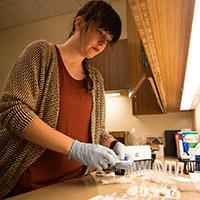 Mary Shiels Mary Shiels, also a 2013 CNS graduate, worked at the call center for about six months before getting a job running a UCSF-affiliated health clinic at the Rene Cazenave Apartments, which provides supportive housing for formerly homeless individuals. A third of her current clients are HIV-positive. “A disproportionately large number for any population,” she says.
Mary Shiels Mary Shiels, also a 2013 CNS graduate, worked at the call center for about six months before getting a job running a UCSF-affiliated health clinic at the Rene Cazenave Apartments, which provides supportive housing for formerly homeless individuals. A third of her current clients are HIV-positive. “A disproportionately large number for any population,” she says.
While Shiels was growing up in San Francisco, her family was active in AIDS volunteer work. As a child, she often helped her father deliver meals to patients, many of whom had the virus.
“This experience and exposure to HIV and AIDS [patients] at such a young age informed my career path in an organic way,” Shiels says. “When I realized in my early 20s that I wanted to be a nurse, knowing I wanted to specialize in HIV was a parallel conclusion. In this specialty, I’m able to work in and be a part of a community that is uniquely tied to San Francisco in many ways, and my own history in this city.”
Working at the call center, a job she was reluctant to leave, was “phenomenal,” Shiels says. “I learned so much clinically and really became confident and brave in my role as an advanced practice nurse. I found the interdisciplinary discussions and exchanges to be the way I learn best. It pushed me to think more critically and look at the literature a little more closely.”

